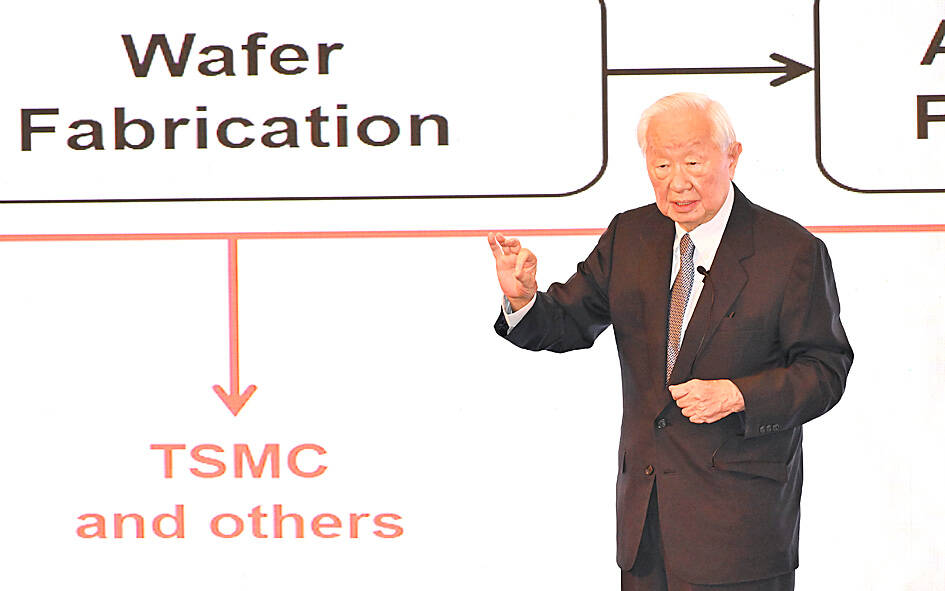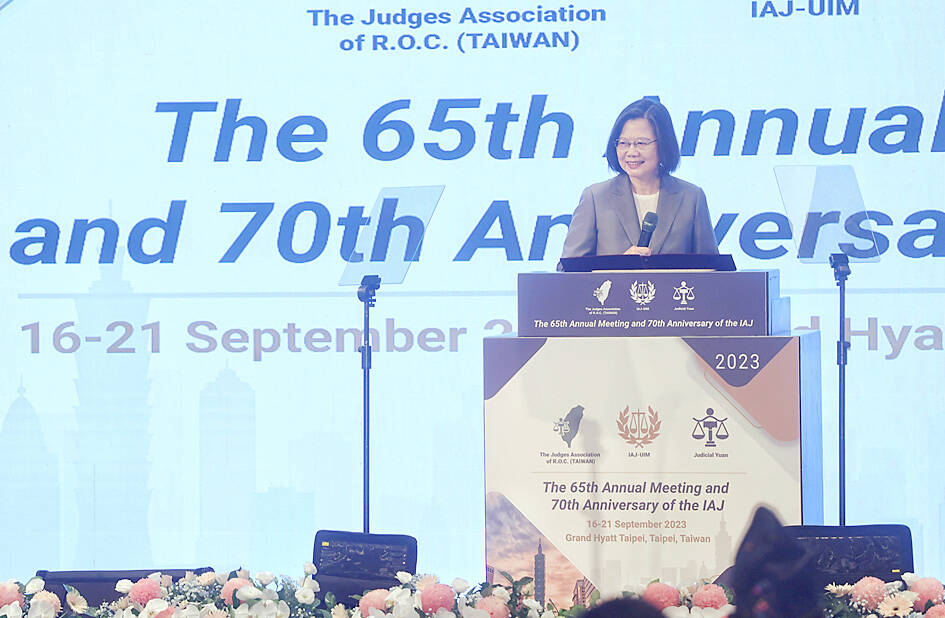Taiwan Semiconductor Manufacturing Co (TSMC, 台積電) founder Morris Chang (張忠謀) yesterday said that a sustainable supply of high-quality and dedicated engineers, and a low turnover rate are contributing factors to Taiwan’s leadership in the global chipmaking industry.
Chang delivered a speech on Taiwan’s competitive advantages in the chip sector at the 70th anniversary of the International Association of Judges (IAJ) in Taipei.
Chang founded the world’s largest contract chipmaker, or foundry, in 1987. The chipmaker now offers research and development, wafer fabrication and advanced packaging, which are capital and technology-intensive businesses, he said.

Photo: Tien Yu-hua, Taipei Times
Chips made by TSMC can be found in national defense, smartphones and vehicles, he said.
In developed countries, about 2.5 billion people use Taiwan-made chips for the devices they use in their daily lives, he added.
As chip manufacturing is a crucial industry and the only crucial industry for Taiwan to be a leader, it needs to defend its leadership position, Chang said.

Photo: CNA
With a highly educated population, Taiwan has plenty of high-quality and dedicated engineers, Chang said.
Those young people are willing to work in the tough chip manufacturing environment, wearing heavy outfits that look like space suits, he added.
TSMC has an employee turnover rate of about 4 to 5 percent annually, which is much lower than the 15 to 20 percent at US companies during the 1970s and the 1980s, he said, adding that a high turnover was “certainly a disaster problem” as it takes years to train technicians and engineers, he said.
The US used to have the most advanced wafer fabrication technology in the world, but things have changed, he said.
TSMC now offers the world’s most advanced foundry technology, outpacing Intel Corp.
Taiwan’s foundry-centric semiconductor fabrication supply chain is also one advantage, with major equipment suppliers ASML Holding NV and Applied Materials Inc setting up service centers in Taiwan, he said.
The Ministry of Economic Affairs yesterday approved an additional US$4.5 billion (US$140.7 million) funding for TSMC’s fab construction in Arizona.
The new funding would help enhance TSMC’s partnership with customers, and would help grow Taiwan’s semiconductor industry and deepen its connections with supply chains, it said.
President Tsai Ing-wen (蔡英文) also gave a speech at the IAJ event, saying the government is striving to reach the highest international standards in judicial independence and human rights protection.
“We cannot take judicial independence for granted. It must be continuously upheld through individual commitments and institutional protections in Taiwan,” Tsai said.
The last time the IAJ held its annual meeting in Taiwan, in 1999, it adopted the Universal Charter of the Judge — a “landmark document” that has helped enshrine the value of judicial independence, Tsai said.
Serving as a blueprint for protecting judicial independence, the charter states that judges should “ensure the rights of everyone to a fair trial” and “exercise judicial powers free from social, economic and political pressure,” she said.
The nation’s commitment to democracy “drives our efforts to build a judicial system that is transparent, accountable and responsive to the people it serves,” she said.
The citizen judge system, where professional judges are joined by members of the public in trials, was launched this year as an effort to ensure greater fairness and trust in the judicial system, she added.
Judicial Yuan President Hsu Tzong-li (許宗力) said in his speech that as judicial departments are facing various challenges and difficulties in a rapidly changing global environment, “it is indispensable that judges around the world strengthen their cooperation and exchanges” to safeguard freedom, judicial independence and human rights.

Tropical Storm Gaemi strengthened into a typhoon at 2pm yesterday, and could make landfall in Yilan County tomorrow, the Central Weather Administration (CWA) said yesterday. The agency was scheduled to issue a sea warning at 11:30pm yesterday, and could issue a land warning later today. Gaemi was moving north-northwest at 4kph, carrying maximum sustained winds near its center of up to 118.8kph and gusts of 154.8kph. The circumference is forecast to reach eastern Taiwan tomorrow morning, with the center making landfall in Yilan County later that night before departing from the north coast, CWA weather forecaster Kuan Shin-ping (官欣平) said yesterday. Uncertainty remains and

SEA WARNING LIKELY: The storm, named Gaemi, could become a moderate typhoon on Wednesday or Thursday, with the Taipei City Government preparing for flooding A tropical depression east of the Philippines developed into a tropical storm named Gaemi at 2pm yesterday, and was moving toward eastern Taiwan, the Central Weather Administration (CWA) said. Gaemi could begin to affect Taiwan proper on Tuesday, lasting until Friday, and could develop into a moderate typhoon on Wednesday or Thursday, it said. A sea warning for Gaemi could be issued as early as Tuesday morning, it added. Gaemi, the third tropical storm in the Pacific Ocean this typhoon season, is projected to begin moving northwest today, and be closest to Taiwan on Wednesday or Thursday, the agency said. Today, there would likely

DISRUPTIONS: The high-speed rail is to operate as normal, while several airlines either canceled flights or announced early departures or late arrivals Schools and offices in 15 cities and counties are to be closed today due to Typhoon Gaemi, local governments announced last night. The 15 are: Taipei, New Taipei City, Taoyuan, Tainan, Keelung, Hsinchu and Kaohsiung, as well as Yilan, Hualien, Hsinchu, Miaoli, Chiayi, Pingtung, Penghu and Lienchiang counties. People should brace for torrential rainfall brought by the storm, with its center forecast to make landfall on the east coast between tonight and tomorrow morning, the Central Weather Administration (CWA) said. The agency issued a sea warning for the typhoon at 11:30pm on Monday, followed by a land warning at 11:30am yesterday. As of

CASUALTY: A 70-year-old woman was killed by a falling tree in Kaohsiung as the premier warned all government agencies to remain on high alert for the next 24 hours Schools and offices nationwide are to be closed for a second day today as Typhoon Gaemi crosses over the nation, bringing torrential rain and whipping winds. Gaemi was forecast to make landfall late last night. From Tuesday night, its outer band brought substantial rainfall and strong winds to the nation. As of 6:15pm last night, the typhoon’s center was 20km southeast of Hualien County, Central Weather Administration (CWA) data showed. It was moving at 19kph and had a radius of 250km. As of 3pm yesterday, one woman had died, while 58 people were injured, the Central Emergency Operation Center said. The 70-year-old